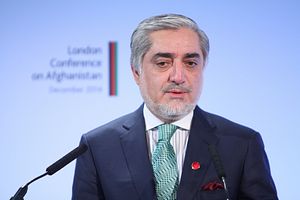Last week, Abdullah Abdullah, the second most powerful man in Afghanistan, wrapped up his five day trip to India. On the last day of his trip, he spoke to a select group of journalists over breakfast. During the course of an hour, Abdullah touched upon the issues impacting Afghanistan today.
At the outset, he talked about the challenges facing the one-and-half-year-old national unity government. Explaining the context of the birth of the new experiment in Kabul, Abdullah, the country’s chief executive officer, said that the regime came into being at a time when majority of the international troops prepared to leave the country. The challenge of managing the security situation in the country was left nearly entirely to the government and it has been difficult so far for the new government.
Regarding the ongoing attempts at resuming the peace process with the Taliban, Abdullah expressed optimism that the quadrilateral group, comprising Afghanistan, Pakistan, the United States, and China, would yield some results. He said that the earlier round of peace talks could not move ahead because of the revelation of Mullah Omar’s death and the consequent confusion within the Taliban ranks.
Abdullah declared that today’s Taliban is not a united entity as it used to be during Omar’s time. However, for him, there is no good or bad Taliban. Any Taliban group that wants to attend talks will have to renounce violence and severe links with the terrorist group. According to the veteran politician, Afghanistan is seeking support from all countries that have direct influence on the Taliban.
Despite his reluctance to sound belligerent on Pakistan, Abdullah conceded that Afghanistan’s western neighbor holds the greatest influence on the insurgent group. He underlined that its role is pivotal in making the peace process meaningful. The Afghan leader said that some Taliban-affiliated groups are based in Pakistan.
Abdullah addressed China’s role in the quadrilateral grouping. China has made huge investments in Afghanistan, he said, and, as a result, it is supporting the country in its industrialization efforts. He also underlined the fact that Beijing has influence over Islamabad and it can always ask Pakistan to play its cards straight as far as the peace talks are concerned.
Abdullah addressed India’s lack of participation in the international process to facilitate peace talks, noting that New Delhi wants the peace process to be Afghan-led and owned. He added that India is being kept in the loop as far as the negotiations are concerned and is thus very much part of the process.
On the issue of the Islamic State in Afghanistan, the leader emphatically said that the government does not have a full picture on the group’s activities. So far, its activities have been mostly confined in eastern Afghanistan.
He termed his visit to India satisfactory and expressed his happiness at New Delhi’s willingness to supply military hardware. He said that there is no “red line” on military support from India now.
When asked about the exodus of Afghans and their urge to take refugee status in Euopean countries, he blamed European countries for announcing an open door policy for refugees. Without naming Germany, the Abdullah said that the open door policy announced by some European countries was taken literally and many people left looking for a better life left for Europe. However, he underlined that the government would facilitate the return of those refugees who want to come back to Afghanistan voluntarily.

































